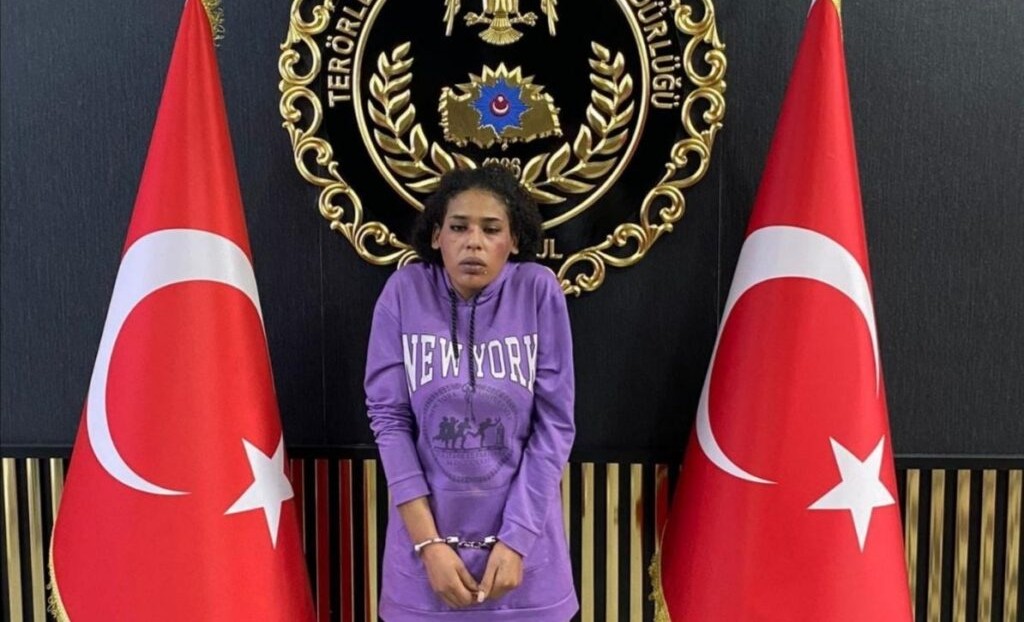Turkey on Monday accused a Syrian woman of planting a bomb that killed six people in İstanbul, blaming the outlawed Kurdistan Workers’ Party (PKK) for carrying out the attack, Agence France-Presse reported.
Two girls, aged 9 and 15, were among those killed when the bomb exploded shortly after 4:00 pm (1300 GMT) on Sunday in İstiklal Avenue, home to smart boutiques and European consulates. More than 80 other people were wounded.
“The person who planted the bomb has been arrested,” Interior Minister Süleyman Soylu said in a statement broadcast by the official Anadolu news agency early Monday.
“According to our findings, the PKK terrorist organization is responsible,” Soylu said.
The PKK, listed as a terrorist group by Ankara and much of the international community, has waged a deadly insurgency for Kurdish self-rule in southeastern Turkey since the 1980s.
Police, quoted by NTV television, said the chief suspect is a Syrian woman working for the Kurdish militants. Forty-six people were detained in total, the police said.
#Taksim İstiklal Caddesinde meydana gelen Bombalı Terör Saldırısını gerçekleştiren terörist YAKALANDI🚨
Olayla ilgili başlatılan çalışmalar çok yönlü olarak devam etmektedir. pic.twitter.com/CniGox6r4u— İstanbul Emniyet Müdürlüğü (@istanbul_EGM) November 14, 2022
Police footage shared with Turkish media showed a young woman in a purple sweatshirt being apprehended in an İstanbul flat.
Police, cited by NTV, named her as Alham Albashir and said she was arrested at 2:50 a.m. in an İstanbul suburb. Local media said she was a trained PKK intelligence operative.
‘Order from Kobane’
There has been no claim of responsibility.
“We believe that the order for the attack was given from Kobane,” Soylu said, referring to a city in Syria near the Turkish border.
PKK-affiliated Kurdish militants control most of northeastern Syria and in 2015, Kurdish fighters drove Islamic State of Iraq and the Levant (ISIL) militants out of the city.
NTV also shared footage of a young woman wearing slacks and a loose black scarf who ran away into the crowd on Sunday afternoon.
Justice Minister Bekir Bozdağ told A Haber television that a woman had been sitting on a bench for more than 40 minutes, “then she got up,” leaving a bag.
“One or two minutes later, an explosion occurred,” he said.
On Monday all the benches had been removed from İstiklal Avenue, where residents laid red carnations at the scene of the blast, some wiping away tears and others speaking of their fear of further attacks in the run-up to elections next June.
“We need more security!” said İdris Çetinkaya, who works at a nearby hotel and came to pay his respects.
‘Live with fear’
“The police just searched my bag when I got here, but that’s the first time in a year. Millions of people come here, anything could happen at any second!” he said.
İstiklal Avenue was previously targeted during a campaign of nationwide bombings in 2015-16 that were blamed mostly on ISIL and outlawed Kurdish militants, killing nearly 500 people and wounding more than 2,000.
On Sunday Turkish President Recep Tayyip Erdoğan denounced the “vile attack” that had the “smell of terror” shortly before leaving for the G20 summit in the Indonesian resort island of Bali.
Kemal Öztürk, a shopkeeper, is among those who fear another explosion ahead of presidential and parliamentary elections in seven months’ time.
“In an election period it can happen. It can happen here or in any city,” the 42-year-old told AFP. “We live with fear.”
İstiklal, in the historic district of Beyoğlu, is one of İstanbul’s most famous streets. It is entirely pedestrianized for 1.4 kilometers, or about a mile.
Criss-crossed by an old tramway and lined with shops and restaurants, it attracts large crowds at the weekend.
Many stores closed early in the neighboring district of Galata, while some passers-by, who came running from the site of the explosion, had tears in their eyes.
Turkey’s radio and television watchdog, RTÜK, placed a ban on broadcasters showing footage of the blast, a measure previously taken in the aftermath of extremist attacks.
Access to social media was also restricted after the attack.
Condemnation
International condemnation flooded in from across the world following Sunday’s attack.
A reaction came quickly from Greece, which “unequivocally” condemned the blast and expressed condolences to the government and people of Turkey.
The United States also denounced it, with White House Press Secretary Karine Jean-Pierre saying, “We stand shoulder-to-shoulder with our NATO Ally Turkey in countering terrorism.”
French President Emmanuel Macron said in a message to the Turks, “We share your pain. We stand with you in the fight against terrorism.”
Ukrainian President Volodymyr Zelensky also tweeted in Turkish, “The pain of the friendly Turkish people is our pain.”
Russian President Vladimir Putin on Monday added his own condolences in a message to Erdogan.
“We reaffirm our readiness for the closest interaction with our Turkish partners in the fight against all forms and manifestations of terrorism,” he said in the telegram.
